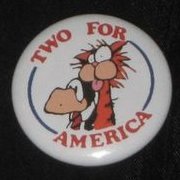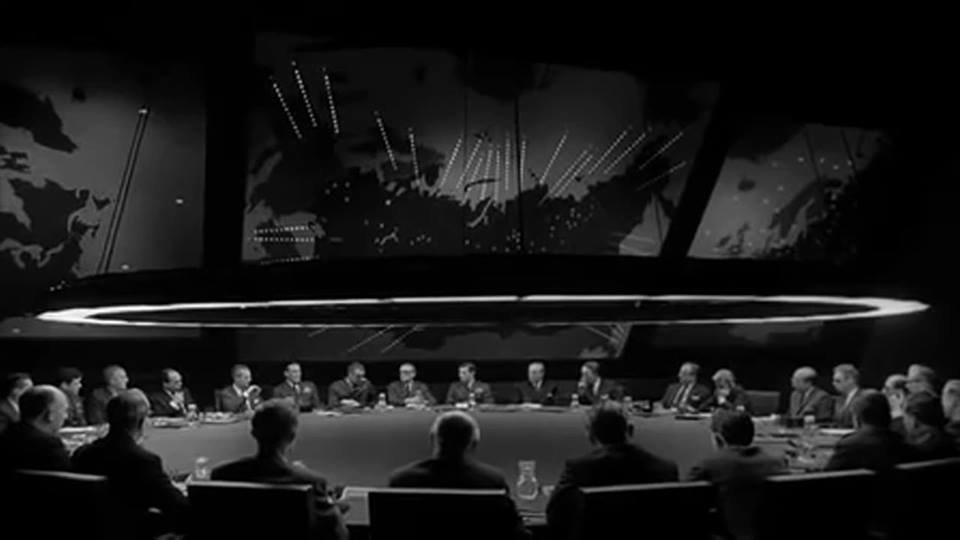-
Posts
1,097 -
Joined
-
Last visited
-
Days Won
1
Content Type
Profiles
Forums
Events
Everything posted by JamesHackerMP
-
I understand the function of the Crown, in that it's not intended to wield power but to prevent someone else from occupying the same position and wielding it. All well and good for the position of head of state, but it provides no checks on the power of the prime minister. If I understand correctly, your PM has enough power to make Richard Nixon drool with envy. As Sir Humphrey himself said: "The prime minister giveth, and the prime minister taketh away. Blessed be the name prime minister." P.S.: which ones were "the duds"?
-
Wilber, aren't the senators appointed by the GG on the "advice" of the PM? (Which in practical terms means they're prime ministerial appointments) Canadians on this website have complained about the composition of the Senate for that exact reason: they're all hacks of former prime ministers. By that logic, the GG is the hack of any given present prime minister. It seems that the only way to have a Canadian governor-general who is totally apolitical is to turn back the clock to the days when he was "London's man", actually appointed by H.M. [British] Government. My research shows that before 1952, the GG's were British citizens, not Canadian residents, and usually peers. (That phun phact brought to you by...) But that of course would make the GG not a Canadian, and maybe such a person would not act in Canadian interests. There is a term political scientists use to describe a country like Japan or Canada: a "crowned republic". In the UK no one picks the Queen. But the Canadian viceroy (GG) is picked by the PM. From what I have now read, Canada's been a de facto republic since 1952. It seems to me it's now a crowned republic and not an actual constitutional monarchy. In the actual UK, the Queen, while restricted by tradition (which she is extremely unlikely to violate), still has the authority to exceed the scope of a simple figurehead if the right circumstances presented themselves. You may call it "royal assent" when your GG signs a bill into law, but again, it's a prime ministerial appointee affixing his signature, with the constitutional fiction that he's doing it on behalf of a monarch 3,000 miles away. A constitutional fiction can be important, but it's fiction nonetheless. If a figure of authority is very, very unlikely to exercise it, it's just as good as not having it at all.
-
If I understand correctly, the whole point (one of the whole points) of parliamentary democracy is that you separate the head of state from the head of government. If the head of government (PM) is actually appointing the acting head of state (GG) via his "recommendation" to the Queen, that's a no-no in a parliamentary democracy, if the GG holds his job by the consent of the PM. You might as well have an elected head of state. In the UK, I wouldn't want to abolish the monarchy. In Canada, yes.
-

Could someone please explain the EU to me?
JamesHackerMP replied to JamesHackerMP's topic in The Rest of the World
Perhaps part of that long period of peace was also due to a common threat and the security umbrella of NATO. If anything, the EU has been passing away that common goal, not helping to foster it. If Europe is torn apart again, it will be Brussels fault, not a thing that occurred despite Brussels best efforts otherwise. -

The Myth - US as a force for good
JamesHackerMP replied to hot enough's topic in Federal Politics in the United States
God, another blame-America-first person...it seems that even your fellow Canadians tire of the old cliche, too. So, out of the most powerful nations on Earth, hotenough, whom would you prefer to be the superpower? (or "hyperpower" as the French put it) -

Chiefs of State & Heads of Government
JamesHackerMP replied to JamesHackerMP's topic in Political Philosophy
Besides, in that event, why not just call him/her [the aforementioned figurehead of state] the President of the Republic of Canada? No beating around the bush, etc... -

Chiefs of State & Heads of Government
JamesHackerMP replied to JamesHackerMP's topic in Political Philosophy
It seems to me the only real difference between maintaining the monarchy and establishing a Canadian Republic would be that the prime minister no longer gets to choose the person who is effectively the real head of state in Canada--the governor general. As I understood it, the separation between the two is one of the hallmarks of parliamentary democracy. When the PM is effectively choosing the GG by personal fiat, doesn't that violate the separation of head of state/head of government principle? -
Exactly. Unless there was a provision in such a hypothetical union that permitted the former Canadian province to retain its form of government, but the entire United States would remain presidential (so the federal government of the US would remain presidential, the new states--former provinces--would not have to change their own governments). I don't know if that would work. Essentially you're right. Americans have a phobia of parliamentary democracy and Canadians of presidential democracy. The former is more suited in a "collectivist" version of democracy; the latter, in a more American-style "individual liberty" model.
-

Chiefs of State & Heads of Government
JamesHackerMP replied to JamesHackerMP's topic in Political Philosophy
depends what you mean by "personification", though doesn't it? -

Chiefs of State & Heads of Government
JamesHackerMP replied to JamesHackerMP's topic in Political Philosophy
I seem to remember that Louis XIV scoffed at the idea. He said, *I* am the state! (Moi, je suis l'etat!) -

Free speech and attendant responsibilities
JamesHackerMP replied to hot enough's topic in Political Philosophy
I'd hate for the US government(s) to have that power. And the liberals who advocate such laws probably haven't factored in the fact that a successive GOP government would use the same laws--not repeal them. They could issue an executive order "you can't say nasty shit about Jesus" after that (for argument's sake). Only then the liberals who advocated the laws would realize their error. -

Chiefs of State & Heads of Government
JamesHackerMP replied to JamesHackerMP's topic in Political Philosophy
In other words, the head of government would have to appoint himself/herself, and that would be bad? -
I think you mean a "bridge in Brooklyn" lol
-

Free speech and attendant responsibilities
JamesHackerMP replied to hot enough's topic in Political Philosophy
wow....just wow. -
I started a thread on constitutional monarchy and its utility in modern democracies today. Not all countries with parliamentary political machinery are monarchies of course. Some are republics, some are constitutional monarchies, and some are what Wikipedia refers to as "crowned republics". What is the purpose (and advantage) of separating the position of head of state and head of government in a democracy? A mostly-ceremonial head of state is a concept that bemuses American political science students, since it's something we're terribly unfamiliar with--we combine the divine and the human natures in one role, like...I dunno, Jesus or something. (Appropriate for its present occupant.) One wonders, if some monarchies are simply "crowned republics" (their chiefs of state have only ceremonial duties, not even in theory do their legal roles bear constitutional substance) then why is there even a head of state at all in some parliamentary governments? The emperor of Japan for example, is little more than a notary public with ceremonial duties. I think it was Walter Bagehot who said the Queen has three roles: the right to be consulted, the right to advise, and the right to warn. The emperor has no such rights, if I understand correctly. The President of Ireland, if I understand, has no rights either. No mystical concept of sovereignty is inherited from the old kings of Ireland. Even the Taoisich--which means "cheiftain"--refers not to their president but to their PM. Here's my question: can you have a parliamentary republic that has no head of state position whatsoever? (Think of the Star Wars prequels: the Supreme Chancellor is elected by the Senate but there is no separate head of state of the Galactic Republic....closest example I can think of.) Would it really matter?
-

Guided Democracy - Covered Dictatorships
JamesHackerMP replied to Altai's topic in Political Philosophy
I never insinuated she was being rude (!!!) -

Guided Democracy - Covered Dictatorships
JamesHackerMP replied to Altai's topic in Political Philosophy
Right. It doesn't mean that all of Europe's leaders are the pope's stooges. So in general, Altai, what are you trying to say about these democracies in question? -

Free speech and attendant responsibilities
JamesHackerMP replied to hot enough's topic in Political Philosophy
So who has the ultimate authority to interpret or enforce this law? the provincial Human Rights Commissions? -

Free speech and attendant responsibilities
JamesHackerMP replied to hot enough's topic in Political Philosophy
how far do these hate-speech laws in Canada go?


